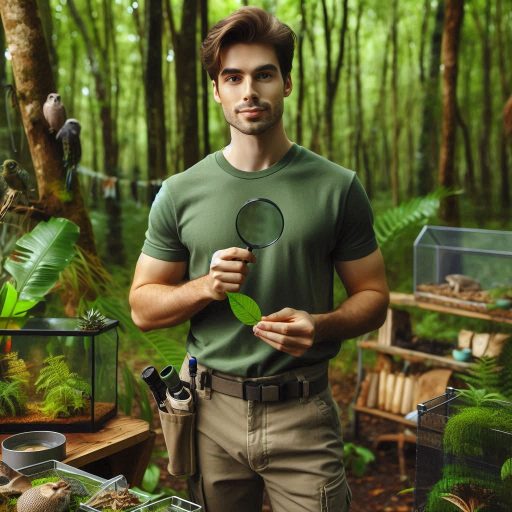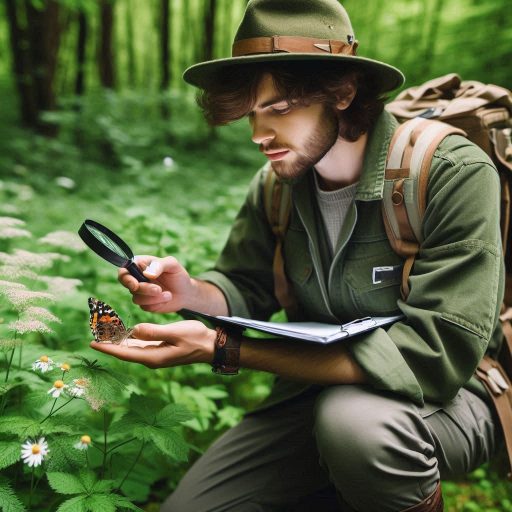Introduction
Volunteering in ecology offers valuable opportunities for aspiring professionals.
Hands-on experience shapes your understanding of ecological principles and real-world challenges.
Engaging in volunteer work enhances your skills and builds essential networks in the field.
Many employers prioritize practical experience when hiring ecologists, making volunteering crucial for career advancement.
By participating in volunteer projects, you can apply classroom knowledge to real-life situations.
This active involvement fosters personal growth and deepens your passion for the environment.
Whether you‘re conducting research, restoring habitats, or educating communities, every task contributes to your professional development.
This blog post will explore various volunteer experiences that can significantly impact your ecology career.
We will discuss opportunities in wildlife conservation, environmental education, and habitat restoration.
Each experience offers unique benefits, allowing you to gain insights into different aspects of ecology.
Through these volunteer roles, you can not only boost your resume but also make a meaningful difference in your community and the natural world.
Get ready to discover how volunteering can transform your journey in ecology and help you achieve your career goals!
Volunteering with Environmental Organizations
Why Volunteer with Greenpeace or World Wildlife Fund?
Volunteering with organizations like Greenpeace or the World Wildlife Fund (WWF) can significantly enhance your ecology career.
These global organizations are at the forefront of environmental advocacy and conservation efforts.
By working alongside passionate professionals, you gain valuable hands-on experience in real-world ecological challenges.
This involvement helps you develop crucial skills such as fieldwork, data collection, and project management.
Plus, contributing to such a meaningful cause gives you a deep sense of purpose.
Valuable Networking Opportunities
One of the greatest benefits of volunteering with well-established organizations is the opportunity to network.
Greenpeace and WWF are deeply connected with leading environmental scientists, policymakers, and activists.
Volunteering here allows you to meet influential figures in the field, including seasoned ecologists and conservationists.
Networking through these experiences can open doors to future job opportunities, internships, or collaborations in the environmental sector.
Connections made during volunteer work can also lead to mentorship opportunities, which are crucial for career growth.
When you volunteer with Greenpeace or WWF, you gain more than just professional connections.
You develop personal skills that are key to excelling in the ecology field.
For instance, many volunteers hone their public speaking and advocacy abilities.
These organizations often run outreach campaigns where you educate the public or policymakers about ecological issues.
Working on campaigns or fieldwork projects also boosts your organizational, communication, and problem-solving skills.
These experiences make you a stronger candidate when applying for jobs or graduate programs.
Success Stories from Volunteers
Many successful ecologists began their careers through volunteering.
Take Sarah, for example, who volunteered with the World Wildlife Fund during her undergraduate studies.
Through her volunteer work, she gained firsthand experience with species protection initiatives.
She also built lasting relationships with professionals in the field, which helped her land her first job as an environmental consultant.
Similarly, Michael, a Greenpeace volunteer, participated in a coastal cleanup project that sparked his passion for marine conservation.
His dedication caught the attention of a senior researcher, who later became his mentor and helped him secure funding for his marine biology research.
These success stories highlight how volunteering can be a pivotal stepping stone in building an ecology career.
The practical experience, combined with networking and mentorship, creates a solid foundation for long-term professional growth.
Volunteering with global environmental organizations like Greenpeace or the WWF offers a unique blend of practical experience and professional connections.
It allows you to contribute to crucial ecological projects while building the skills and relationships necessary for a successful career in ecology.
These opportunities not only enrich your professional life but also deepen your commitment to the cause of protecting our planet.
Discover grants and funding sources for ecological research, including NSF, EPA, NIH, and more. Tips, examples, and how-tos! Apply now.
Read: Key Roles and Responsibilities of a Chemist in the US
Participating in Conservation Projects
Volunteering with local conservation projects offers invaluable opportunities to impact ecosystems and wildlife positively.
Engaging in these efforts can lead to significant environmental benefits.
Every volunteer contributes to protecting habitats and preserving biodiversity.
These actions create healthier ecosystems that support various species.
Impact of Volunteering With Local Conservation Projects on Ecosystems And Wildlife
Conservation projects aim to restore and protect natural habitats.
Volunteers play a critical role in these initiatives.
For instance, tree planting projects help combat deforestation and climate change.
Trees provide essential oxygen and improve air quality.
They also create habitats for numerous species, supporting local wildlife.
Beach clean-ups significantly reduce plastic pollution in oceans.
Volunteers remove trash from shorelines, protecting marine life.
Sea turtles and seabirds often mistake plastic for food.
By cleaning beaches, volunteers directly contribute to safeguarding these species.
Additionally, removing debris protects fragile coastal ecosystems, promoting their recovery and resilience.
How Hands-On Experiences In Conservation Projects Can Enhance Skills And Knowledge In Ecology
Hands-on experiences in conservation projects enhance skills and knowledge in ecology.
Volunteers learn practical techniques for habitat restoration and wildlife monitoring.
These experiences deepen understanding of ecological principles.
Participants often gain insights into species behavior, ecosystem dynamics, and environmental challenges.
Many projects involve training sessions led by experienced professionals.
Volunteers learn about biodiversity, conservation strategies, and sustainable practices.
This education is invaluable for anyone pursuing a career in ecology.
Understanding the complexities of ecosystems prepares volunteers for future roles in environmental science.
Volunteering also fosters teamwork and leadership skills.
Participants often work alongside like-minded individuals.
This collaboration promotes effective communication and problem-solving.
These skills are crucial in any ecological career.
Networking with professionals can open doors to internships and job opportunities.
Examples of Conservation Projects
Numerous conservation projects welcome volunteers.
Tree planting initiatives are common across various regions.
Organizations like the Arbor Day Foundation offer opportunities for community involvement.
Participants can help restore forests and urban green spaces.
Beach clean-up events are organized by groups such as the Ocean Conservancy.
Volunteers gather at local beaches to remove debris and educate the public.
These events often include educational components about marine conservation.
Invasive species removal projects are another vital area for volunteer involvement.
Local parks and nature reserves often seek help to control non-native plants.
Removing these species helps restore native habitats and supports local wildlife.
Citizen science projects are also excellent for those interested in ecology.
Volunteers can collect data on wildlife sightings, water quality, and plant health.
Organizations like iNaturalist provide platforms for citizen scientists to share their findings.
This data contributes to ongoing research and conservation efforts.
Participating in conservation projects significantly impacts ecosystems and enhances knowledge in ecology.
Volunteers play a vital role in protecting wildlife and restoring habitats.
By getting involved in these initiatives, individuals gain valuable skills while making a difference.
Each effort, no matter how small, contributes to a healthier planet.
Read: Earning Potential: Chemist Salaries Across US States
Volunteering at Wildlife Rehabilitation Centers
Wildlife rehabilitation centers play a crucial role in rescuing and caring for injured and orphaned animals.
These centers focus on the recovery and release of wildlife back into their natural habitats.
Volunteers provide essential support to these centers, helping care for animals and maintain facilities.
This hands-on experience offers a unique opportunity for volunteers to contribute to wildlife conservation while gaining valuable knowledge.
The Role of Wildlife Rehabilitation Centers in Rescuing and Caring for Injured Animals
Wildlife rehabilitation centers are dedicated to the care and recovery of injured, sick, or displaced animals.
They often receive animals affected by human activity, such as collisions with vehicles or habitat destruction.
The primary goal of these centers is to treat, rehabilitate, and release animals back into the wild whenever possible.
Volunteers are key to this process, assisting staff in daily care routines, including feeding, cleaning, and monitoring the health of animals.
By participating in this essential work, volunteers directly contribute to the conservation of wildlife populations.
Opportunities for Volunteers to Assist in the Rehabilitation Process
Volunteering at wildlife rehabilitation centers offers numerous opportunities to work closely with a variety of species.
Volunteers help clean enclosures, prepare food, and provide enrichment activities for the animals.
They may also assist in administering medical care under supervision, helping to rehabilitate injured animals.
In addition, they learn how to recognize signs of stress, illness, and improvement in different species.
This hands-on experience is invaluable for those interested in careers in wildlife conservation, veterinary medicine, or environmental science.
It also provides volunteers with a deeper understanding of wildlife behavior and the challenges of conservation efforts.
Many wildlife rehabilitation centers also offer educational programs for volunteers.
These programs can include workshops on wildlife handling, species identification, and conservation strategies.
Volunteers learn about the importance of preserving natural habitats and how human actions can impact wildlife.
By gaining this knowledge, volunteers become more informed advocates for wildlife conservation, spreading awareness within their communities.
Volunteering at these centers helps individuals build skills that are applicable to future roles in the ecology and conservation sectors.
Volunteer Experiences: Gaining Skills and Connections
Many volunteers at wildlife rehabilitation centers report life-changing experiences and the development of practical skills.
Volunteers gain direct experience in animal care and conservation, which is highly valued in related fields.
Additionally, they form connections with professionals in the conservation and wildlife rehabilitation communities.
These relationships often lead to future career opportunities or internships in the ecology field.
For example, one volunteer at a center in California shared how their work with raptors led to a job offer at a national wildlife refuge.
Another volunteer at a Florida-based center learned essential medical techniques for treating reptiles, which helped them secure a veterinary internship.
The skills, knowledge, and professional networks gained from volunteering can significantly enhance an individual’s ecology career.
This hands-on experience demonstrates commitment, dedication, and passion for wildlife conservation.
By contributing time and effort at wildlife rehabilitation centers, volunteers not only support animals in need but also take meaningful steps toward advancing their careers in ecology.
Read: Top Chemistry Departments and Schools in the US

See Related Content: Certifications and Licenses for Toxicologists
Transform Your Career Today
Unlock a personalized career strategy that drives real results. Get tailored advice and a roadmap designed just for you.
Start NowDiscover More: How to Start a Career in Botanical Research
Joining Citizen Science Initiatives
Citizen science initiatives offer valuable opportunities for volunteers to actively engage in ecological research.
In these programs, volunteers collect and analyze data for ongoing scientific projects.
This collaboration between the public and scientists helps generate massive datasets for meaningful ecological studies.
These initiatives allow non-experts to play an important role in addressing pressing environmental challenges.
How Citizen Science Programs Involve Volunteers In Collecting and Analyzing Data For Research Projects
Citizen science initiatives invite volunteers to gather field data for specific ecological research projects.
These programs focus on a variety of topics, including wildlife monitoring, plant biodiversity studies, and water quality assessments.
Volunteers work closely with scientists to ensure data accuracy, following simple protocols designed for non-experts.
The collected data is then analyzed to track environmental changes, helping professionals make evidence-based decisions.
For example, bird counting programs are popular citizen science activities.
Volunteers identify and record bird species in specific areas.
These bird surveys help scientists track migration patterns, population trends, and habitat preferences.
Data from these efforts informs conservation strategies, improving the protection of bird species and their habitats.
Benefits for Volunteers and Ecologists
Participating in citizen science initiatives offers numerous benefits for volunteers and professional ecologists alike.
For volunteers, it‘s an opportunity to gain hands-on experience in ecology while contributing to real-world research.
This involvement provides insight into the scientific process and enhances their understanding of environmental issues.
It also boosts their skills in fieldwork, data collection, and observation, which are essential for a career in ecology.
Moreover, citizen science projects help volunteers build professional networks.
Working alongside experienced ecologists opens doors to mentorship opportunities, expanding career prospects.
For students or early-career professionals, this exposure can lead to future internships or job opportunities in the field of ecology.
For professional ecologists, citizen science programs provide a vast amount of data that would be impossible to gather alone.
The participation of volunteers significantly enhances research efforts by increasing the scale of data collection.
This allows ecologists to detect trends in wildlife populations, environmental changes, and other ecological phenomena more efficiently.
Additionally, by engaging the public in science, ecologists raise awareness about environmental issues and promote conservation action.
Notable Citizen Science Projects to Join
There are numerous citizen science projects that volunteers can participate in.
One of the most well-known is the Audubon Society‘s Christmas Bird Count, a nationwide survey that tracks bird populations across the United States.
This project has contributed to conservation efforts for over a century.
Another example is Project BudBurst, where volunteers monitor plant life cycles to study the effects of climate change on plants.
For those interested in marine ecosystems, Reef Check invites volunteers to survey coral reefs and assess their health.
Habitat monitoring programs, such as FrogWatch USA, involve recording frog and toad calls to track amphibian populations.
Volunteering for these projects not only helps scientists but also gives volunteers a deeper connection to nature and valuable ecological knowledge.
Read: How to Become a Licensed Chemist in the USA: Steps and Tips
Volunteering at National Parks or Nature Reserves
Volunteering at national parks or nature reserves provides aspiring ecologists with invaluable field experience.
These protected areas offer a chance to engage in hands-on conservation efforts while surrounded by natural beauty.
Whether you‘re interested in wildlife conservation, habitat restoration, or environmental education, these opportunities allow you to immerse yourself in nature while contributing to important ecological work.
Opportunities to Support Conservation Efforts
National parks and nature reserves often rely on volunteers to support their conservation initiatives.
You could assist with trail maintenance, wildlife monitoring, or invasive species removal.
These tasks directly impact the health of ecosystems and provide essential support to park staff.
By volunteering, you gain firsthand experience in ecological management and contribute to the preservation of natural habitats.
In addition to conservation work, many national parks offer opportunities for environmental education.
Volunteers can lead guided nature walks or participate in public outreach programs.
Teaching visitors about the importance of biodiversity and sustainable practices fosters a deeper connection between people and nature.
This experience in public engagement is a valuable skill for ecologists who wish to inspire conservation awareness in others.
Benefits of Gaining Field Experience in These Protected Areas For Aspiring Ecologists
Fieldwork is crucial for anyone pursuing a career in ecology.
Volunteering at national parks or nature reserves provides direct exposure to the day-to-day challenges and rewards of working in the field.
You‘ll learn to navigate diverse ecosystems, identify plant and animal species, and understand ecological dynamics.
This practical experience can‘t be replicated in a classroom setting.
Additionally, you‘ll have the opportunity to work alongside park rangers, biologists, and conservation specialists.
Collaborating with experienced professionals allows you to gain mentorship and insights into the complexities of ecological work.
Observing their techniques and learning from their expertise can significantly shape your understanding of the field.
For aspiring ecologists, the skills developed during volunteer work are invaluable.
You‘ll strengthen your ability to conduct field research, collect data, and analyze ecological patterns.
Moreover, you‘ll become proficient in teamwork, problem-solving, and adapting to unpredictable outdoor conditions.
These skills are essential for success in any ecology-related career.
Tips for Finding Volunteer Opportunities
Start by exploring the websites of national parks or nature reserves near you.
Many parks post volunteer opportunities on their official websites, where you can apply directly.
It‘s also helpful to contact the volunteer coordinator or visitor services office for information about ongoing projects.
Look for seasonal programs, especially in the spring and summer when many parks ramp up their conservation activities.
Be open to different roles, as some might focus on education while others emphasize hands-on ecological restoration.
Join environmental organizations or local conservation groups that partner with national parks or nature reserves.
They often provide volunteer opportunities and may offer training workshops or networking events that can further support your career goals.
Volunteering at national parks or nature reserves not only helps conservation efforts but also enriches your experience as an aspiring ecologist.
These opportunities offer practical knowledge, professional connections, and a deeper understanding of the natural world.
See Related Content: The Role of DNA Analysis in Forensic Science
Conclusion
Gaining hands-on experience through volunteer work is crucial for building a strong ecology career.
Participating in wildlife conservation projects enhances your knowledge of species protection.
Assisting with field research develops your technical skills in data collection and analysis.
Working on habitat restoration teaches you the importance of ecosystem management.
Volunteering with environmental organizations helps you build networks with professionals in the field.
Participating in citizen science initiatives connects you with ongoing research and global ecological efforts.
Engaging in community education allows you to share knowledge and raise environmental awareness.
Each of these experiences contributes directly to your growth and expertise as an ecologist.
Volunteering not only strengthens your resume but also deepens your commitment to ecological preservation.
It is an opportunity to apply theoretical knowledge to real-world situations.
Explore various volunteer roles and make the most of each one.
Diversifying your experiences will provide a well-rounded foundation for advancing in the ecology field.
Hands-on involvement will set you apart and give you the practical skills needed for a successful career in ecology.
[E-Books for Sale]
The Big Book of 500 High-Paying Jobs in America: Unlock Your Earning Potential
$19.99 • 500 High-Paying Jobs • 330 pages
Explore 500 high-paying jobs in America and learn how to boost your career, earn more, and achieve success!
See All 500 High-Paying Jobs of this E-Book
1001 Professions Without a Degree: High-Paying American Jobs You Can Start Now
$19.99 • 1001 Professions Without a Degree • 174 pages
Discover 1001 high-paying jobs without a degree! Unlock career tips, skills, and success strategies for just $19.99!




